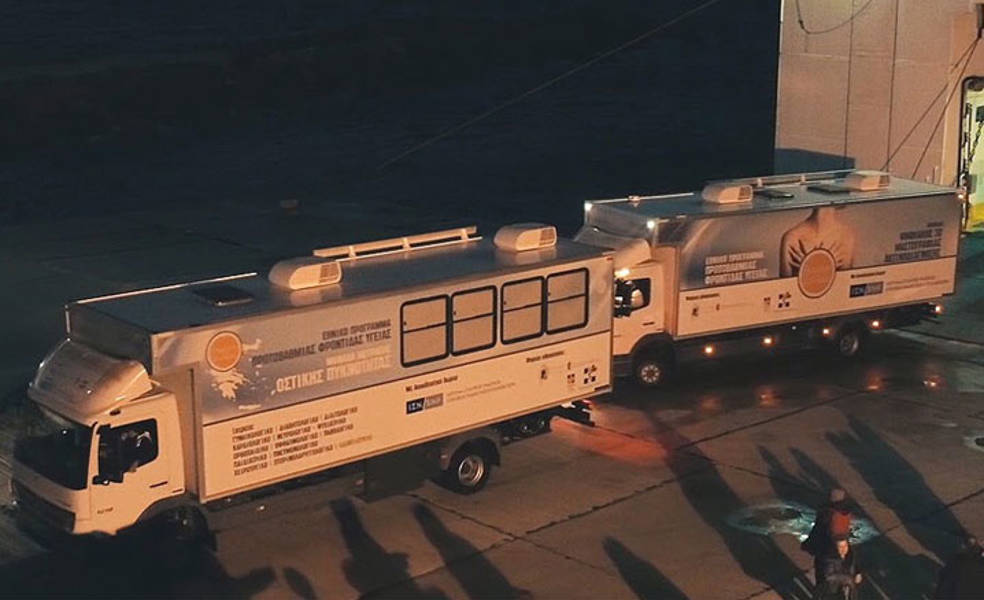
Mobile Medical Units: Moving Heaven and Earth to Offer Free Medical Help
A significant portion of the Greek population must plan a routine check-up, days or weeks in advance, without any guarantee that they will make their appointment.
On their planned day of departure, the ships may be idle at docks due to the weather. The examination is postponed until the next week, when the next boat leaves for Piraeus—provided an appointment is still available and, of course, weather permitting.
This is the reality faced by thousands of Greek citizens—elderly people, people with mobility problems or limited financial capacity, among others—living on remote islands and hard to access regions of Greece. Minimal health infrastructure and a lack of specialized medical staff near their homes compel them to make long journeys to seek medical care. As part of the Grants Against the Crisis, the Stavros Niarchos Foundation (SNF) looked to find a solution by reframing the problem. Rather than residents of remote areas traveling long distances to access hospitals and diagnostic centers, what if the hospital could travel to them?
This idea, which initially seemed utopian, became a reality through the perseverance and determination of a number of partners. In 2014, at the initiative of and with the exclusive support of the SNF, the Mobile Medical Units (MMU) program was created to provide free medical care to residents of remote areas in Greece. The program is implemented by the NGO Regeneration & Progress in collaboration with Health Units S.A., under the auspices of the Ministry of Health and the National and Kapodistrian University of Athens.
The five-year initiative included the procurement of two Mobile Medical Units, equipped with a 3-D digital mammography unit, dentistry equipment, a bone density scanner, a portable X-ray machine, and other state of-the-art medical equipment. These enable medical personnel to set up, within two hours, a pop-up clinic in a suitable public space in the remote areas they visit.
Each mission lasts two to three days, during which time residents have the opportunity to consult 15 types of specialists. Specifically, the Mobile Medical Units provide access to specialists in the following fields, as well as 26 qualified nurses and technical staff: radiology, general practice, general surgery, gynecology, cardiology, neurology, dentistry, orthopedics, ophthalmology, pediatrics, otolaryngology, dietetics, psychology, occupational therapy, and psychiatry. Residents can receive a range of medical examinations, including X-rays, Pap tests, electrocardiograms, mammography tests, and tumor scans, learning about the heritability of diseases and how they can minimize future problems for themselves and their relatives.
The first mission took place in January 2014 in Kastelorizo. Since then, 38 missions have taken place in areas such as Kasos, Tilos, Agios Efstratios, and Agrafa, with the most recent mission taking place on the island of Anafi. Throughout the year, the Mobile Medical Units visit a different destination every month—remote islands and hard to access mountainous areas of mainland Greece. One month before each mission, a registration service is offered by a temporary council established at the prospective destination, in cooperation with the municipal authorities. This council facilitates the planning and booking of examinations and appointments in order to ensure the smooth operation of the mission.
An electronic medical record is created for each patient, recording their health history and any examination findings, to keep them informed about their health and provide further guidance, as needed.
To date, more than 13,600 patients have been examined, and 37,956 medical appointments and 23,968 medical tests have taken place. A significant number of examinations have provided diagnoses of cardiac problems and different types of tumors, which have since been referred to Olympic Village Polyclinic and Attikon General University Hospital in Athens, for further testing and have been addressed through their early diagnosis. In several cases, surgeries were performed and emergency incidents were addressed during a MMU visit, including serious injuries, cardiac events, and seizures.
During the visit of MMUs, public lectures by specialized professionals are taking place on subjects such as learning difficulties, mental health, nutrition, and administering first aid.
The Mobile Medical Units program could not have become a reality without the valuable contribution of the collaborating scientific staff who devote one weekend per month to their fellow citizens in need. Participating physicians, nurses, and technical staff close their offices, postpone their personal obligations, and leave their homes and families to provide their services and to ensure that more people have free access to comprehensive health services.
In the summer of 2015, a new component was added to the Mobile Medical Units program to address another dimension of health: Sports Paths. The Sports Paths initiative is also implemented by the NGO Regeneration & Progress with the exclusive support of SNF. The program was created following a survey that found that a significant proportion of children living in remote islands are overweight and lack exercise, while only 3% know how to swim safely, despite living next to the sea. The Sports Paths program offers swimming lessons and instruction in sports such as basketball, fencing, and tennis, as well as movement coordination games.
The original plan called for the Mobile Medical Units program to last five years. However, before the end of the five-year period, the Stavros Niarchos Foundation decided to renew its grant for an additional five years to cover the needs of 48 geographically remote areas, including 22 islands and 26 locations in mainland Greece, expanding the number of monthly missions from one to three. An opportunity to improve and hopefully extend life for a large underserved population merits moving heaven and earth to make it happen. Moving a hospital to make it happen is certainly worth it.